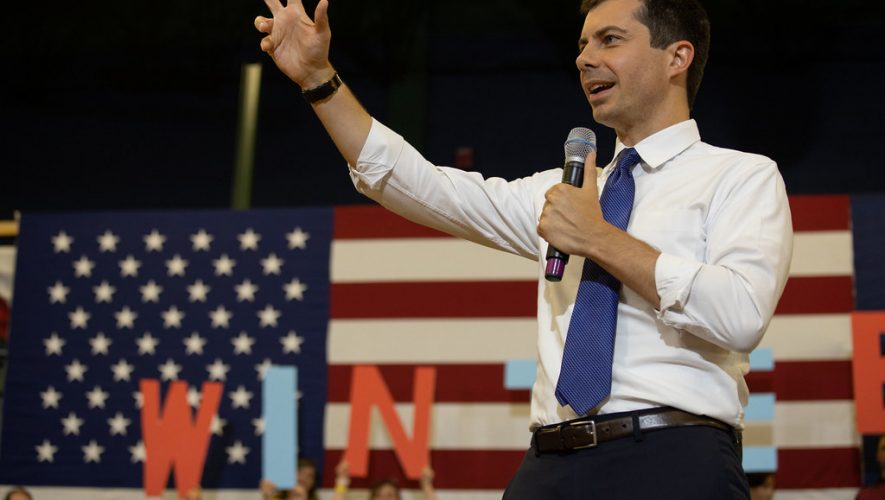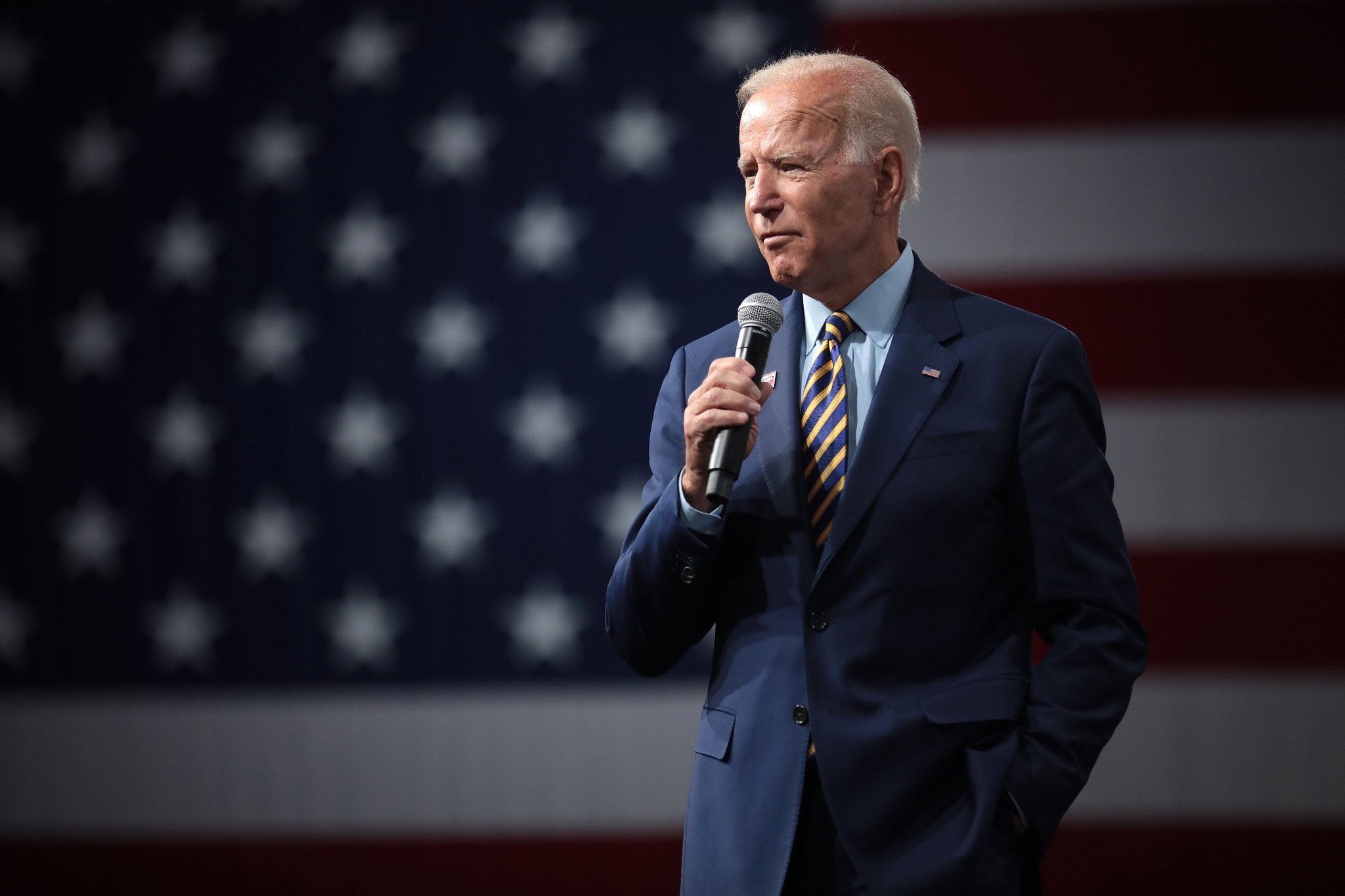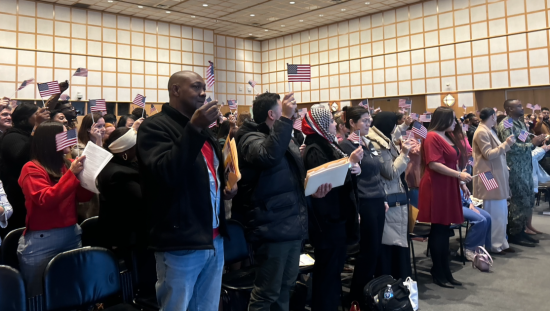New Hampshire, like Iowa, has always been a key state and area of hyper-focus for presidential contenders. It holds the first primary, resulting in a disproportionate influx of rallies and campaigns in the small state and, in-turn, a politically engaged electorate.
At a town hall event in Concord on November 9, Joe Biden served chili to firefighters and local residents. While this event’s demographic was slightly different from that of a Pete Buttigieg rally later that day in New Hampton, voters at both echoed a similar sentiment. For voters in this purple state interested in Biden and Buttigieg, unity and moderation were of utmost importance.
Both Biden and Buttigieg are marketed in their campaigns and by their policy proposals as more moderate Democratic contenders—a feature that many, especially older voters, deem particularly electable.
As of December 13, 2019, Biden enjoys the highest national polling average at 27 percent whereas Buttigieg is at 10 percent. Despite these figures, recent data from Iowa suggests that Buttigieg may actually rank higher among Democratic voters than the former vice president. The South Bend mayor receives 19 percent support from likely Iowa Democratic caucus-goers, while Biden receives 15 percent—data that indicates a significant shift in moderate support within the Democratic base.
Maureen McCabe, 66, is a retired schoolteacher and New Hampshire voter. She and her longtime significant other, Rich Bruno, 73, were at Biden’s town hall. McCabe and Bruno—both registered Democrats and Hillary Clinton supporters in 2016—support Biden, although they have some reservations about the former vice president.
Source: Gage Skimore
“You got to have a strong candidate who crosses a lot of different lines,” explains Bruno, who campaigned for Biden in the past. “I think the only thing Joe Biden might have an issue with is probably the younger generation and maybe millennial classes.”[1]
McCabe recognizes the roadblocks Biden might face with younger voters, but believes voting for Biden is a no-brainer.
“I think I’m going with the experience overall in the big picture. And I just like him as a person. I think he’s down to earth and he’s got a funny side to him,” explains McCabe. “But it’s the experience, and I resent how people are attacking his age, which is ridiculous.[2]
“We need a transition. To adopt all of these ultra-liberal concepts right now, they just won’t pass anyway. So it’s better to have someone who’s more even-keel to get us through this terrible situation right now.”
While Bruno is a registered Democrat, he describes himself as a more moderate voter, part of the reason why he finds Biden appealing.
“I like that he’s a more moderate and I guess that’s the side that I’m on. Some of his policies are not as progressive and I just can’t—I can’t attach myself to some of the more progressive policies, especially on the healthcare issue,” explains Bruno. “But I think he’s a man that can take over day one and people will feel comfortable with him and he will gain respect around the world because he’s just been proven as a good leader and a good representative of the United States and we’re not getting that right now.”
Bruno, a retired transportation services manager from a blue-collar, Democrat-supporting Massachusetts family, has aligned with the party for decades. But, being a moderate, he noted that he has considered switching parties for certain candidates like former Ohio Governor John Kasich.
“Joe to me is the one that will probably garner the most [support] across all lines,” he notes, “and I think he’s acceptable on both progressive and moderate sides.”
Toni Caushi and Kaitlin Cawley of Worcester, Massachusetts, represent the younger generation that Bruno nodded to. Both 26, they stood off to the side at the Biden town hall event, observing the crowd from the border fence of the courtyard. While the two young professionals are independent voters, they favor candidates like Bernie Sanders and Elizabeth Warren.
“I don’t like being a partisan. I don’t like being someone who’s just stuck to the side and puts on a blindfold and says ‘I’m going to be this for the rest of my life,’” explains Caushi. “Always give your ear up to everyone so you can hear what anybody has to say, what anybody has to offer and then make the choices objectively.”[3] But even after considering this moderate, older Democrat, Caushi’s candidate of choice is not Biden. For him, education is the biggest priority, so candidates like Warren and Sanders have piqued his interest.
Similarly, Cawley has her sights set on Warren and Kamala Harris, who has since dropped out of the race.
“Women’s rights in general and equality is something that’s important to me,” she explains. “And I guess in the end I’m always going to look and vote for someone who stands for what I think is most important.”[4] While Cawley said she wouldn’t feel discouraged if Biden were the Democratic bid, she definitely would not be thrilled as he doesn’t speak to her as a young female voter.
The attitudes of Cawley and Caushi are no exception to voter trends and polling data. Twenty-five percent of voters aged 18–29 said they would vote for Sanders if the primary elections were held today, while 16 percent said they would vote for Warren, according to a Spring 2019 Harvard Youth Poll. And while Biden won a parallel 16 percent of the would-be young vote, critics suggest that he will struggle to win youth support if he becomes the Democratic nominee. Indeed, six percent of Biden’s support in the New Hampshire ranks came from voters aged 18–34, while 11 percent was from voters aged 35–49, according to a CNN 2020 New Hampshire Primary Poll.
Another October Iowa poll echoed these trends, as 31 percent of seniors aged sixty-five and older expressed support for Biden, while only two percent of voters under thirty supported him. Voters over the age of forty-five account for the vast majority of his support—a believable trend given the largely older demographic of the Concord campaigning event. As younger voters skew further left, it makes sense that moderate candidates don’t garner their support. According to the same Iowa poll, the popularity of Warren and Sanders soared among Democratic voters in this tossup state. Warren, at 22 percent, was ranked as first choice in the Iowa caucuses, while Sanders was at 19 percent and Biden trailed at 17 percent. Because Iowa and New Hampshire provide early indications of voting trends and set the tone for the rest of the country, these statistics are particularly important to consider.
Buttigieg, on the other hand, seems to reflect another, more contemporary alternative for the would-be Biden base—moderate, white, and generally older voters. Valerie Charboneau, a fifty-two-year-old software architect from northeastern Ohio, stood to the back of the barn at the Buttigieg rally. Still undecided, Charboneau, a registered Democrat who voted for Clinton in 2016, said that she was there to learn more about the South Bend mayor.
“I just heard recently in the news that he’s rising up into the top three or four, so I wanted to learn more about him,” explained Charboneau. “I’m going to vote for whichever [candidate] everybody decides on. I love Elizabeth Warren’s ideas, but I think that there’s a huge part of America that’s not ready for her, just like they weren’t ready for Hillary. So I waver between should I be promoting someone who’s more electable or someone who has big ideas? It’s really a conundrum at this point.”[5]
In the Iowa poll, Buttigieg was actually ranked higher than Biden (18 percent for first choice in the caucuses), suggesting that the mayor is tapping into Biden’s base. Buttigieg is rising in the ranks because he provides a middle ground between Warren or Sanders and Biden, a middle ground many believe essential to electability.
The conundrum that Charboneau describes is one that many Democrats are wrestling with. While many voters indicate that they would like more extreme policy change, many also are scared of losing the moderate vote. Indeed, what a large majority of Democrats want most is to beat Trump, and policy in many ways takes a back seat. Electability is what most Democrats are looking for, creating a national stump in unity and agreement throughout the electorate.
While Charboneau expressed support for more left-leaning candidates, she fears that bidding on someone more extreme may result in a similar situation to 2016, where moderate voters were lost to the Republican side. She explains:
“I think it makes the argument too easy [for Donald Trump] if you have a candidate that on-the-record has said things that are so far left that you’re going to alienate the middle. Because God knows we need the middle, regardless of where I wish we were politically. I mean, I lean pretty far left, but I also don’t want four more years of this.”
For Charboneau, issues including the environment, abortion access, equal protection under the law, and healthcare are on her mind when looking through the many Democratic contenders. And while she does not have her sight set on one candidate in particular, Buttigieg is attractive because of his broad appeal—a characteristic that she considers essential.
Among the faces in the crowd were Josef Marcum, 41, and his wife, Laura Weit-Marcum, 45, both New Hampshire residents and voters. Weit-Marcum, a registered Democrat, convinced her husband, an independent voter, to attend the rally.
Marcum, an engineer working for the international manufacturing company Viega, puts healthcare at the top of his policy list. While he is currently undecided, Marcum wants to see a middle-of-the-road candidate as the Democratic nominee, even if he personally is in favor of further left-leaning policy.
“I’m definitely anti-Trump. So I just want to make sure whoever I vote for is going to be the candidate that has the best chance of beating the Republican [nominee],” explains Marcum. “I don’t want somebody who’s extreme on either side—even if I’m on the extreme side, I don’t want that.”[6]
For Wiet-Marcum, who is currently a stay-at-home mom but worked for the Department of Environmental Services for thirteen years, tough climate policy is among her biggest priorities.
“I think we do need somebody who is moderate, who is able to bring the country together and someone who everyone can get behind and support. I think the things that I’m more cautious about is more of the left wing, although I agree with the ideas and the principles. But I don’t think that everybody can get behind them,” explains Wiet-Marcum, voicing a similar sentiment to many middle-aged Democratic voters.[7] “The middle of the road just seems to be the path of least resistance to make sure that [the nominee] is somebody that [we] can come in and support.”
While she is also undecided, Wiet-Marcum favors Buttigieg over Biden when looking toward the more moderate Democratic contenders.
“I don’t like Biden. I don’t think he’s relatable and he just seems like he’s sort of off in his own little world.” Beyond name recognition as former vice president, Wiet-Marcum doesn’t think he’s particularly qualified to lead the country, either. “I don’t like how he’s not articulate. He comes across really poorly in the debates I think, and he just seems really old . . . It just doesn’t seem like he’s in touch with the rest of America.”
David Loker, 73, stood toward the front of the barn, eager to hear Buttigieg speak. He even had a question prepared for the mayor about electability. A retiree who recently moved to New Hampshire from Massachusetts, Loker was an independent voter for much of his life but registered as a Democrat in 2018. While he is not set on Buttigieg, so far Mayor Pete is among his favorite candidates—one of the reasons being Buttigieg’s moderate yet firm stance on a number of social issues.
“Medicare For All is a buzzword for frequently Elizabeth Warren and Bernie. But these ideas are things that are never going to happen, and that’s why I can’t get excited about that because they’ll never get passed like that! Incremental change is going to happen and it’s going to come from the middle,” explains Loker, embodying a view that seems to be shared by many others in the crowd.[8]
“But I think in order for anybody to get elected today, you can’t just be a far-left or an ultra-conservative right. You’ve got to appeal to the middle. And Pete—and there’s a number of them that I think can do that—Biden would but I think Joe’s too old.”
As New Hampshire reflects much of the atmosphere for the rest of the American electorate, this focus on electability raises an interesting issue. Democrats throughout the nation express desire for a candidate who can heal the nation’s partisan divide by promoting compromise and unity.
This reality creates some major issues, however. In 2016, the effects of nominating a more center-left Democratic contender were clear. Without youth support, winning the election is nearly impossible. While “anyone but Trump” Democrats and Republicans alike are looking toward Biden, Buttigieg, and Amy Klobuchar, Warren may be the candidate most capable of bridging the generational divide. And without bridging the generational divide, electoral unity can never be achieved.
Regardless of stance, Democratic voters are looking for someone to unify the country by any means necessary, even if that means holding off on progressive policy for now.
[1] Bruno, Rich. Interview by Taraneh Azar. Concord, New Hampshire. November 09, 2019.
[2] McCabe, Maureen. Interview by Taraneh Azar. Concord, New Hampshire. November 09, 2019.
[3] Caushi, Toni. Interview by Taraneh Azar. Concord, New Hampshire. November 09, 2019.
[4] Cawley, Kaitlin. Interview by Taraneh Azar. Concord, New Hampshire. November 09, 2019.
[5] Charboneau, Valerie. Interview by Taraneh Azar. New Hampton, New Hampshire. November 09, 2019.
[6] Marcum, Josef. Interview by Taraneh Azar. New Hampton, New Hampshire. November 09, 2019.
[7] Weit-Marcum, Laura. Interview by Taraneh Azar. New Hampton, New Hampshire. November 09, 2019.
[8] Loker, David. Interview by Taraneh Azar. New Hampton, New Hampshire. November 09, 2019.




